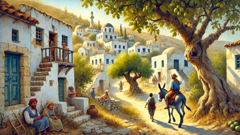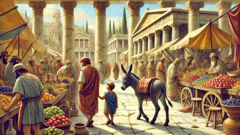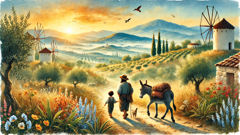Introduction
In the rolling hills of ancient Arcadia, where the olive groves shimmered with silver-green leaves and the distant sea mirrored the bluest sky, a well-trodden road wound its way from the quiet villages to the bustling agora of the city. Along this dusty path, beneath the generous sun and the watchful gaze of marble gods, ordinary people carved out their lives—tilling earth, raising families, and weaving stories that would endure for centuries. Among these tales, none captured the laughter and wisdom of the people quite like the story of the miller, his son, and their faithful donkey. In this land of timeless beauty, where the scent of wild thyme mingled with the briny breeze and cicadas sang from dawn until dusk, lived a miller named Nikolas. He was a broad-shouldered man with a sun-warmed smile, known throughout his village for his honest work and gentle heart. His only son, Andreas, was a boy on the cusp of manhood, brimming with curiosity and eager to prove himself in a world that seemed, at times, impossibly large. Their companion was a sturdy grey donkey called Milos, who had served the family faithfully for many years—carrying sacks of flour, fetching water from the well, and occasionally ferrying the young Andreas on his back during playful races through the fields. The story begins on a golden morning at the edge of summer, when Nikolas decided to journey to the city market to sell their finest flour. With Andreas at his side and Milos patiently waiting at the gate, the trio set out along the sun-dappled road, unaware that their simple journey would become a lesson whispered through generations. Their path would take them past olive orchards alive with laughter, through fragrant meadows where wildflowers danced, and into the heart of a village that buzzed with opinions as vivid as its market stalls. What starts as an ordinary day soon becomes a parade of advice and criticism, as neighbors, elders, and strangers each weigh in on how the miller and his son should treat their donkey. Through every encounter, the ancient Greek countryside offers its own quiet wisdom: the wind in the trees, the wisdom of the earth, and the enduring truth that trying to please everyone often pleases no one at all.
Setting Out on the Path: The First Opinions
The sun, newly risen, stretched warm fingers across the land as Nikolas and Andreas left the village behind. Milos ambled at their side, swishing his tail with patient contentment. The flour sacks—painstakingly milled from the season’s best wheat—were securely bundled, promising a good price at market. The air was thick with the scents of rosemary and sun-baked earth. Birds greeted them with melodic bursts from the cypress trees. Andreas skipped ahead, every sense alive with anticipation. He wondered what wonders the city might hold and how his father would bargain at the agora. Nikolas, meanwhile, felt the soft weight of responsibility—he had taught Andreas the value of hard work, but also hoped to show him that wisdom is not always measured in coin.

As they crossed a stone bridge over a burbling brook, the first villagers appeared—a pair of women balancing amphorae, gossiping in cheerful voices. One, a round-faced matron, paused to watch the trio approach. “Look at that!” she exclaimed to her companion, gesturing at Nikolas and Andreas walking alongside Milos. “A fine donkey going to waste, while you two wear out your feet! Why not ride and spare yourselves?”
Andreas looked up, uncertain. Nikolas met his son’s eyes with a shrug. “Perhaps she’s right. Climb up, my boy,” he said, and helped Andreas onto Milos’s sturdy back. The boy grinned, gripping the donkey’s mane. They continued on, Nikolas leading Milos by the halter.
Not far along, they encountered a group of elderly men resting beneath a fig tree. Their beards gleamed white as the mountain snows, and their words carried the weight of many seasons. One frowned, tapping his staff. “Is this how youth repays age? The boy rides while his father walks? In my day, sons showed more respect!”
A flush rose to Andreas’s cheeks. He slid from Milos’s back. Nikolas nodded to the elders in deference. “Perhaps you’ll ride now, Father?” Andreas offered.
Nikolas hesitated, but seeing the disapproval on the elders’ faces, he mounted Milos. Andreas walked beside him, feeling awkward with each step. The path wound onward, through meadows daubed with poppies and yellow broom. The city seemed closer, yet every encounter left them more uncertain. They soon met a band of children herding goats, who stared wide-eyed at the sight.
“Look! That man rides while his poor son walks! What kind of father is he?” one girl called out. The other children nodded in agreement, their voices rising in a chorus.
Nikolas sighed, sliding from Milos. “It seems we can’t win, Andreas,” he murmured. “First we’re foolish for walking, now for riding.” The two exchanged a glance—an unspoken bond of frustration and affection.
As the morning wore on, the trio passed vineyards heavy with ripening grapes. Sunlight played on the green hills, but both father and son carried a growing burden: the opinions of everyone they met. The simple journey was becoming a tangled web of advice, each thread pulling in a different direction.
At last, an idea dawned on Nikolas. “Why not ride together? Surely no one can object to that.” So, with some effort and much laughter, Nikolas and Andreas climbed onto Milos’s broad back, careful to balance their weight. The donkey snorted but plodded onward dutifully. The city walls now shimmered in the midday heat, drawing closer with every step. But as the miller, his son, and their donkey approached the city’s outskirts, they were about to discover that public opinion was as endless as the road itself.
The Marketplace of Opinions: Lessons Under the Mediterranean Sun
As the city’s silhouette sharpened against the radiant sky, Nikolas and Andreas felt the nervous flutter of anticipation. The market was always a world unto itself—a place where voices jostled louder than waves against the harbor and bargains were struck beneath fluttering awnings. Yet today, their journey was already heavy with doubts planted by well-meaning strangers.

Just outside the city gates, they met a stern-faced merchant leading a mule laden with pottery. He stopped short, eyeing the overloaded Milos with a look of disapproval. “What’s this? Two grown men atop a single beast? Have you no mercy for such a faithful animal? He’ll collapse beneath you!”
Nikolas and Andreas quickly dismounted, cheeks burning with embarrassment. They led Milos through the arched gates on foot. The city’s hubbub rushed around them—peddlers hawking figs and olives, women selling woven baskets, the clang of the blacksmith’s hammer. Every step brought a new set of eyes, each brimming with judgment.
An old woman sweeping her stoop called out, “Why bother with a donkey if you’re going to carry your own goods? At least make use of what you have!”
Further along, a group of philosophers gathered on marble steps debated animatedly. One, with a beard as wild as brambles, pointed at Nikolas. “There! Another example of mankind’s indecision. Neither man nor beast knows its proper place these days!”
The father and son exchanged weary glances. Andreas’ excitement had faded; Nikolas felt his patience thinning like worn sandal leather. They paused at a fountain shaded by plane trees. Milos drank deeply, while the two humans sat in silence.
“Father,” Andreas finally said, “how do we know what’s right? Every person tells us something different.”
Nikolas looked at his son—the confusion in his eyes, the lines of uncertainty etched around his mouth. He realized this journey was no longer just about flour or coin; it was about something deeper, a lesson neither had expected to learn.
After a moment’s reflection, Nikolas smiled softly. “My son, listen to Milos. He does what’s needed—he walks when he must, carries when he must, and never worries about what others think. Perhaps there’s wisdom in that.”
But their ordeal was not quite over. As they neared the market square, a crowd gathered to watch their approach. Some shook their heads at the sight of Nikolas and Andreas walking beside Milos, others whispered about their earlier choices. No matter what they did, someone seemed dissatisfied.
One particularly loud baker shouted above the din, “Why not carry your donkey if you’re so worried about him? That would please everyone!” The suggestion was met with laughter and jeers.
For a moment, father and son looked at each other—then at Milos, who flicked his ears in confusion. The pair realized how absurd their situation had become. Trying to please everyone had led them in circles, eroding their confidence and making them the subject of ridicule. They shared a rueful smile and decided to let go of everyone else’s opinions.
With renewed resolve, Nikolas loaded the sacks onto Milos and patted his loyal companion. “We’ll do what’s right for us,” he said firmly. Andreas nodded in agreement. Together, they entered the bustling market, ready to face whatever came their way—not by bending to every voice, but by trusting their own judgment.
Conclusion
As the sun began its slow descent behind the hills, casting long shadows across the agora, Nikolas, Andreas, and Milos prepared to return home. Their flour sacks were lighter, but their hearts were unburdened in a new way. The journey had started with a simple goal—to sell their wares—but had become a tapestry woven from every voice and opinion they’d encountered. In the end, they’d discovered the futility of chasing approval from all sides. The ancient olive trees whispered their silent wisdom as they walked: true contentment lies not in pleasing everyone, but in choosing your own path with kindness and conviction. From that day on, word of the miller and his son’s journey spread through the villages and fields, retold at hearths and festivals. It reminded each listener—whether young or old, farmer or merchant—that authenticity and wisdom often go hand in hand. And somewhere along the dusty Greek road, beneath a sky wide as hope itself, Milos the donkey brayed contentedly, untroubled by the world’s opinions, content to serve and be loved just as he was.













